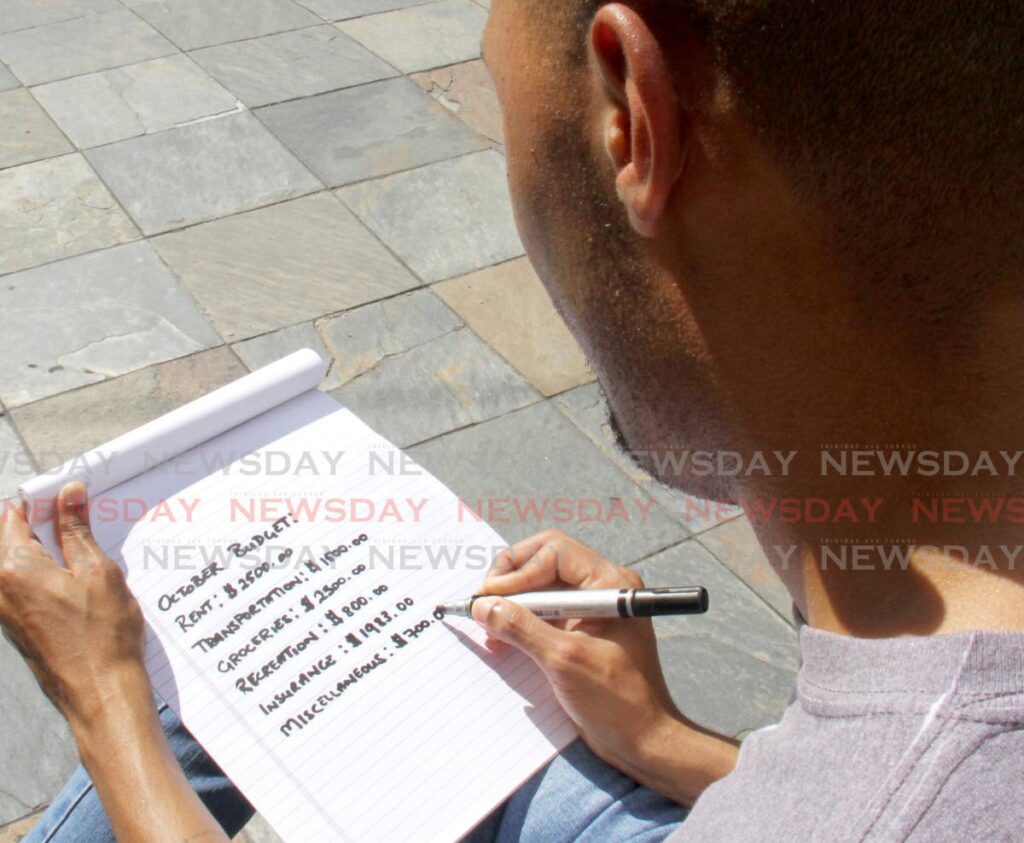Budget jitters, families wary of fuel hike

"I don’t know how. I’ll just have to deal with it."
That was the response of several people who expressed unease about the announcements Finance Minister Colm Imbert may make in the 2024 national budget on Monday, and how any new fiscal measures could affect them.
Sunday Newsday spoke to several people about their expectations, and many had similar concerns.
The most prominent were a further reduction in the fuel subsidy and the resulting increase in fuel prices. And not only because it would cost more to fill their gas tanks, and to travel, but because of the trickle-down effects, including the rise in food prices.
However, they were also worried about an increase in the online purchase tax, decreases or elimination of social grants, and inadequate allocations to the ministries of National Security and Education.
Tunapuna resident Lisa Grandison, 26, said she was a travelling officer and was given a fixed travelling allowance. She said the company previously paid travelling officers based on mileage but that changed and made her life difficult.
She said her partner often complained about the prices of grocery items constantly increasing, which would increase further if fuel prices were raised.
Now, she reserved her grocery shopping trips for when she worked in the San Fernando area, as the price differences were notable. So, she said, she was not sure what else she could do to reduce her grocery bill if the government further reduced the fuel subsidy.
“Really, it’s already a problem for me, and my partner helps me a lot with my gas bill. I have no idea where (in her budget) I will cut, because we already only buy what we need, and buy in bulk when we can.”
Another way she saved was by shopping online, so she was also concerned about the government increasing the online purchase tax.
Even with the current seven per cent tax, buying certain items online was cheaper than buying them in TT. She said she partially furnished her apartment through online shopping as well as buying work clothes and prescription glasses.
For example, she said in TT she paid $3,500 for her glasses but only $400 online.
“We’re not big spenders. We don’t buy extravagant or luxury stuff or go out often. All of our bills are necessities, so I don’t know what we will cut. I will figure it out, but I’m trying not to think about it too much.”
A 75-year-old retiree, who wished to be known only as Alphonso, said even though the national budget affected him and his wife, he had not given the budget “any real thought” in years, other than to lament the increase in gas prices.
He said, as pensioners, he and his wife were on fixed incomes and strict budgets. And every time fuel prices increased in the past few years, it cost him about an extra $100 a month.
“I would hope that the price of gas does not increase this time, because it squeezed me on every occasion in the past. Pensioners don't get (salary) increases the way other people do ,and we have to pinch here and pinch there. So if I have to find $100 extra for gas, it means I have to take that off of something else, and I don’t know where to go again.”
He said he might be able to squeeze $25 from his grocery bill or light bill by further reducing their air conditioning use, and his wife may be able to do the same on her budget, but it would not be much, as the grocery bill would most likely increase with the rise in the cost of gas.
The possible introduction of the property tax was also on his mind but, as he was disciplined with his finances and a planner, Alphonso may have some leeway.
He estimated what his monthly property tax would be and started putting half of that money aside just in case it was implemented. He said he had done that for the past four years and when, at the end of the year, no property tax was announced, he used the money.

Alphonso said, in addition to his pension, he gets a $1,500 social welfare grant. He said the authorities were quick to remind recipients they were not entitled to grants, so the funding could be stopped.
“I already had to cut back during covid, when suddenly grocery items went from $12 to $22 when we weren’t getting grain and such from Ukraine. I stopped buying it, or just treat myself to it every four months.
“If they were to come now and say they are taking that $1,500 away from you because you no longer qualify for it, they will really put a spoke in my wheel.”
Homemaker Alicia Eversley, 42, had similar concerns about increases in fuel and food prices, but those concerns were exponential, with three teenagers and one pre-teen daughter, and her husband being the only breadwinner.
She said the girls were still growing so they ate a lot, grew out of clothes often, and constantly needed toiletries. Because some of their schedules were different and they lived in Mausica, the family needed two vehicles and she, especially, was on the road a lot, dropping them to school and to other activities.
Eversley said she cooked most days and rarely bought fast food. The family already spent about $700 a week on gas, $600 per month on bulk items, $500 a month on produce, $1,000 on meat and fish and she still had to make small purchases every week when stocks ran out.
She was also concerned that the government would not put enough money into the ministries of National Security and Education. With four girls, she was constantly worried about their safety and hoped the budget would allow the police to get more resources to increase patrols and generally fight crime.
She said it was also a financial challenge to ensure her daughters were in well-rounded and stable schools. She said the schools were not well-funded and teachers were frustrated, not only due to their salaries, but because they did not have the tools they needed.
The insufficient funding from the government meant parents had to help provide resources, which put pressure on the family’s resources, as the girls attended three different schools. Also, she said because of their frustration, some teachers were not attending classes or going the extra mile for the students.
“And if they start with the property tax, I don’t know what will happen. I personally will have to cut out things for myself, switch to cheaper and only basic toiletries, and maybe reduce foodstuff like snacks and juice.
“Because our household income is about $12,000 a month, we don’t qualify for grants. So it’s too much to qualify, but really, it’s not enough. I think with those grants they should take into consideration the number of people in the household.”
However, Eversley admitted the government needed to increase revenue, especially after the country’s financial slump during the pandemic and the limited production of oil and gas.
The government has been operating on a deficit budget since 2009, with a balanced national budget in fiscal 2008 and an almost-balanced one in 2022.
In October last year, Imbert reported the country’s total expenditure for fiscal 2022 was an estimated $54.54 billion and the deficit $329 million, which was less than 0.2 per cent of GDP.
Despite that positive news, the government was also in debt. The Central Bank’s Annual Economic Survey 2022 said, up to September 2022, the country owed $139.4 billion. This included several million US dollars borrowed to support the vulnerable and to repay VAT refunds during the pandemic.
In addition, in September 2022, Imbert said, calculated up to June 2023, back pay at a four per cent salary increase for the approximately 41,000 mainstream public servants will cost the government about $2.43 billion, and the additional annual cost will be around $500 million.
Mainstream public servants include police, fire, and prison officers, soldiers and teachers. The Amalgamated Workers’ Union was the first to accept the government’s four per cent offer. Since then the Defence Force, Police, Fire and Prison Services, and TT Unified Teachers 'Association have settled for a four per cent increase in wages.


Comments
"Budget jitters, families wary of fuel hike"